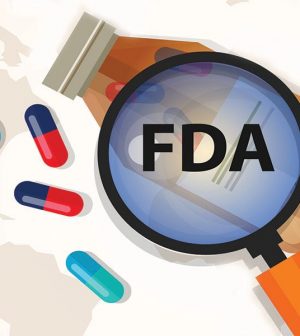- Recognizing the Signs of Hypothyroidism
- 10 Strategies to Overcome Insomnia
- Could Artificial Sweeteners Be Aging the Brain Faster?
- Techniques for Soothing Your Nervous System
- Does the Water in Your House Smell Funny? Here’s Why
- Can a Daily Dose of Apple Cider Vinegar Actually Aid Weight Loss?
- 6 Health Beverages That Can Actually Spike Your Blood Sugar
- Treatment Options for Social Anxiety Disorder
- Understanding the Connection Between Anxiety and Depression
- How Daily Prunes Can Influence Cholesterol and Inflammation
FDA Clamping Down on Abuse of an OTC Decongestant

Makers of inhalers that contain the nasal decongestant propylhexedrine should make design changes to prevent misuse, the U.S. Food and Drug Administration says.
Propylhexedrine is a nasal decongestant in over-the-counter inhalers, and right now is “only marketed under the brand name Benzedrex,” the FDA said. The agency said that propylhexedrine is effective and safe when used for short periods as directed for relief of congestion due to colds, hay fever or other upper respiratory allergies. But misuse can bring dangers.
“Benzedrex inhalers can be legally purchased, but propylhexedrine abuse occurs as people try to find legal ways to get high or increase productivity and concentration,” according to the National Capital Poison Center (NCPC).
“There have been many reports of toxicity associated with propylhexedrine extracted from an inhaler and swallowed or injected. Swallowing the contents of one propylhexedrine inhaler has caused heart attack and lung injury in adults and children,” the NCPC added.
The FDA warns that reports of abuse and misuse of propylhexedrine have been on the rise. The drug can lead to serious problems — including fast or abnormal heart rhythm, high blood pressure and paranoia — that can result in hospitalization, disability or death.
“We are requesting that all manufacturers of [over-the-counter] propylhexedrine nasal decongestant inhalers consider product design changes that support its safe use,” the FDA said in a news release.
“For example, modifying the product to create a physical barrier that would make tampering with the device and abusing the propylhexedrine inside more difficult,” the agency said.
Reducing the amount of propylhexedrine in inhalers could also lower the risk of serious side effects, the FDA noted.
“We continue to evaluate this safety issue and will determine if additional FDA actions are needed,” the agency said.
Propylhexedrine was developed over 60 years ago as a substitute for amphetamine, once the active ingredient in Benzedrex inhalers, according to the NCPC. The center noted that the change was made in response to abuse and deaths from amphetamine extracted from the inhalers.
Propylhexedrine reduces swelling and inflammation of the nasal lining. The recommended dose for adults and kids over 6 is two puffs in each nostril, not more often than every two hours. It shouldn’t be used for more than three days at a time.
Prolonged use may cause congestion to recur or worsen.
The FDA urged people to call 911 or poison control at 800-222-1222 if someone using propylhexedrine experiences severe anxiety or agitation, confusion, hallucinations or paranoia, rapid heartbeat or abnormal heart rhythm, chest pain or tightness.
If you have questions about the drug, including how to use it or whether it may interact with another medicine you take, talk to a pharmacist or your health care provider, the FDA urged.
More information
The Laguna Treatment Hospital has more on propylhexedrine abuse.
SOURCE: U.S. Food and Drug Administration, news release, March 25, 2021
Source: HealthDay
Copyright © 2026 HealthDay. All rights reserved.










